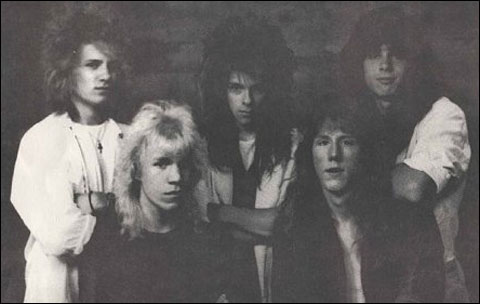
Rivers Cuomo (center) and Avant Garde. |
So much of the tension in Weezer's æsthetic derives from the way Rivers Cuomo keeps taking his shred-metal background and forcing it into a sunny pop-punk package. That's also the key to the band's general air of self-depreciation. To understand Weezer, at some level you have to familiarize yourself with Cuomo's pre-Weezer band, Avant Garde. "You have to understand, I grew up in Connecticut and was part of a progressive-metal scene," he explains. "Our songs were eight or nine minutes long, with time and key changes and harmonized guitar solos and mediæval-themed lyrics. So I had a very, uh, broad palette of techniques, and 99 percent of it got cut out by the time we finished the first Weezer record."
In many ways, Weezer as a concept was a reaction to Avant Garde's reception. "Right after high school," Cuomo continues, "I moved from Connecticut to LA with this metal band. And I assumed that because we were so technically proficient, we should therefore become incredibly successful and popular, merely because of our technique. It wasn't until we got to Hollywood and started getting feedback from people in the clubs and people in the industry that we realized that no one in the audience cared about the technique, how fast you could play, etc. They were interested in something called 'songs,' and 'hooks.' And we panicked — we scrambled, and very quickly tried to reinvent ourselves."
Anyone who knew any local metal bands (of whatever home town) at the dawn of the '90s remembers this part all too well, as the teased hair was brought down to earth and bands changed their metal names to something monosyllabic and meaningless. Avant Garde became Zoom, and Cuomo started projects called Fuzz and 60 Wrong Sausages in LA. Meanwhile, his day job at Tower Records introduced him to non-metal influences like the Pixies and Nirvana. It was a time of mass metal repression.
"We were definitely trying to rid ourselves of metal, because we just thought it was silly," he recalls of Weezer's early days. "During the band's first year of existence, Matt [Sharp, bassist and founding member who left after Pinkerton to focus on his other band, the Rentals] and I lived in this house with some other like-minded friends, and we couldn't stop reminiscing about our metal days. It was driving us crazy, because whenever we saw each other, we'd just start going like, 'Oh yeah, remember Saxon?', and stuff like that. So we started this thing called the Metal Jar, which was just a jar with a slot in the lid, and whenever anyone mentioned anything about metal, they'd have to put a quarter in the jar. And it added up! I don't remember what we did with it, but there was a lot of money in there! So we had this almost irresistible urge to laugh about how extremely silly our belief in metal was, especially as teenagers."
The truth, though, is that once a metalhead, always a metalhead: there are breadcrumb clues in every Weezer album that a shredhead is behind it all. "Oh yeah, I can definitely hear it," Cuomo acknowledges. "Even on 'The Blue Album,' I hear those Metallica guitars. For example, take a look at 'Undone (The Sweater Song)' and compare it to 'Welcome Home (Sanitarium)' by Metallica [from 1986's Master of Puppets]. Seriously, check those two out side by side and you'll be surprised!"
READ:Weezer: The Early Years: Rivers Cuomo reflects on the making of "Blue" and Pinkerton.